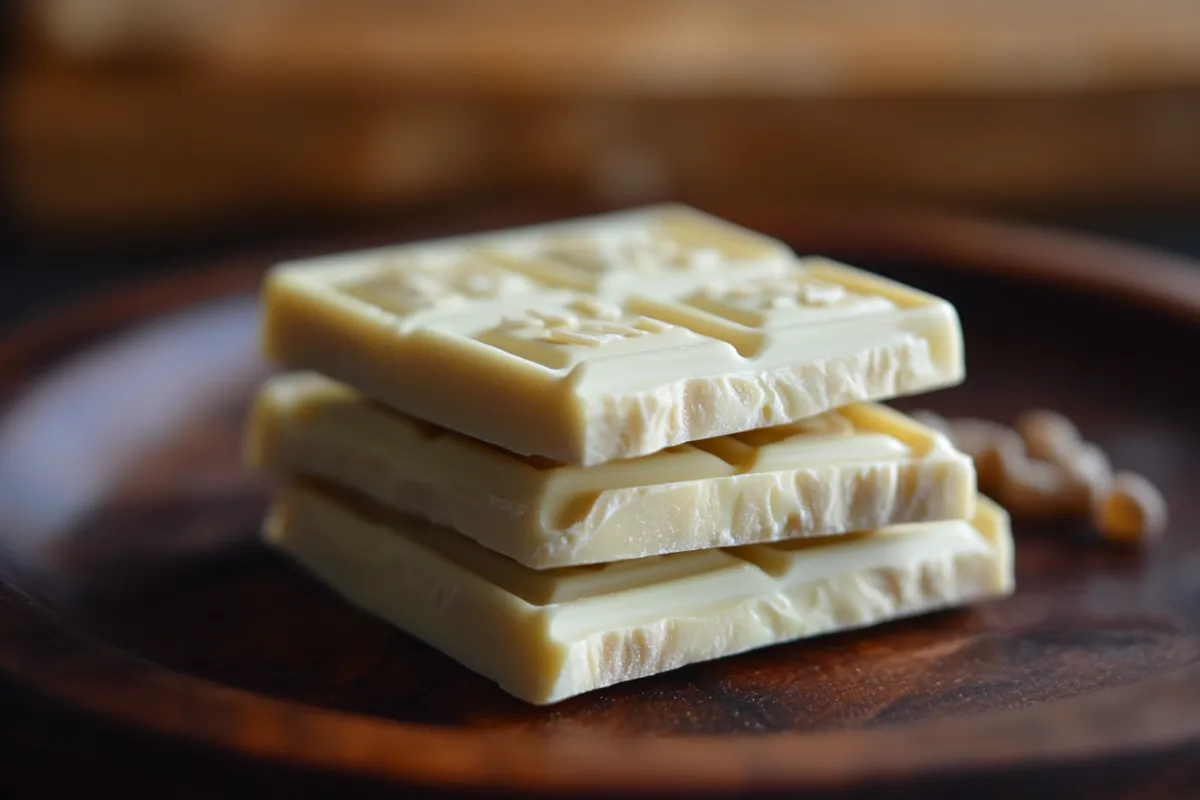Is White Chocolate Healthy? A Comprehensive Analysis
Introduction to White Chocolate and Health Concerns
White chocolate, with its creamy texture and sweet taste, is a favorite among many. However, its health impact has been a subject of debate. Unlike dark chocolate, white chocolate lacks cocoa solids, which are known for their health benefits. This absence raises a key question: Is white chocolate healthy? In this article, we will explore the health implications of white chocolate, including its nutritional content, potential benefits, and associated risks.
What Is White Chocolate?
Definition and Ingredients
White chocolate is different from dark and milk chocolate. It is made primarily from cocoa butter, sugar, and milk solids. Unlike dark chocolate, which contains cocoa solids, white chocolate consists only of the fatty portion of the cocoa bean, known as cocoa butter. This gives it a unique texture and flavor.
- Cocoa Butter: Provides the smooth, rich texture.
- Sugar: Adds to the creamy sweetness.
- Milk Solids: Contribute to its creamy consistency and mild, milky flavor.
Comparison with Dark and Milk Chocolate
White chocolate stands apart from dark and milk chocolate in several ways. Dark chocolate contains cocoa solids, which are rich in antioxidants. These compounds offer numerous health benefits. Milk chocolate, with its blend of cocoa solids and milk, is creamier but less beneficial than dark chocolate. White chocolate, on the other hand, lacks cocoa solids entirely, which means it misses out on those antioxidants.
For more information, explore our White Chocolate Guide.
Potential Health Benefits of White Chocolate
Source of Healthy Fats
Cocoa butter, a key ingredient in white chocolate, contains healthy fats. These include monounsaturated and polyunsaturated fats. Monounsaturated fats can help reduce bad cholesterol (LDL) levels. This reduction lowers the risk of heart disease. Polyunsaturated fats provide essential fatty acids like omega-3s and omega-6s, which are important for brain function and cell growth.
Rich in Calcium
White chocolate contains milk solids, making it a source of calcium. Calcium is essential for maintaining strong bones and teeth. It also plays a vital role in muscle function, nerve transmission, and hormone release. Regular intake of calcium-rich foods, like white chocolate, can help prevent osteoporosis.
Contains Vitamins and Minerals
White chocolate offers small amounts of vitamins and minerals. These include vitamins B2 (riboflavin) and B3 (niacin), as well as magnesium, phosphorus, and iron. These nutrients contribute to overall health. Riboflavin and niacin are essential for energy production and cellular function. Magnesium and phosphorus support bone health and energy metabolism.
Skin Health Benefits
Cocoa butter, the main fat in white chocolate, is often praised for its skin benefits. It is rich in antioxidants and has moisturizing properties. These qualities may help improve skin elasticity and reduce the appearance of scars and wrinkles. Some studies suggest cocoa butter can help protect the skin from UV damage.
For more on the health benefits of chocolate, including how it can benefit your skin, check out our article on the Health Benefits of Eating Chocolate.
Health Risks Associated with White Chocolate
High Sugar Content
One major concern with white chocolate is its high sugar content. On average, an ounce of white chocolate contains about 15-20 grams of sugar. Consuming too much sugar can lead to weight gain, increased risk of type 2 diabetes, and dental problems. High sugar intake has also been linked to inflammation, which can contribute to chronic conditions like heart disease.
Saturated Fats
White chocolate has a significant amount of saturated fats. These fats can raise cholesterol levels and increase the risk of heart disease if consumed in excess. The American Heart Association advises limiting saturated fat intake to reduce cardiovascular risk. Although cocoa butter contains stearic acid, a type of saturated fat that doesn’t raise LDL cholesterol as much, moderation is still crucial.
Lack of Antioxidants
Unlike dark chocolate, white chocolate lacks antioxidants like flavonoids. These antioxidants are important for protecting the body from oxidative stress. Oxidative stress can damage cells and lead to chronic diseases. Without cocoa solids, white chocolate does not offer these antioxidant benefits, making it a less nutritious option.
Impact on Metabolism
White chocolate’s high-calorie content can affect metabolism and contribute to weight gain if consumed regularly in large quantities. This is particularly concerning for those trying to manage their weight or improve metabolic health. The combination of high sugar and fat content increases the risk of metabolic syndrome, a condition that raises the risk of heart disease, stroke, and diabetes.
For more insights into the health implications of chocolate, read our article Is Chocolate Healthy or Not?.
Moderation and Healthy Eating
The Importance of Moderation
Moderation is key when it comes to white chocolate. While it can be enjoyed as part of a balanced diet, overconsumption can lead to health problems. Understanding portion control and limiting how often you eat white chocolate can help reduce risks. The recommended serving size for white chocolate is about one ounce, which contains roughly 150-170 calories.
Incorporating White Chocolate into a Healthy Diet
There are ways to enjoy white chocolate without compromising your health. Consider pairing it with healthier options like fruits or nuts to balance the sugar content. Using white chocolate as a topping or in small amounts in recipes can also help control intake while still allowing you to enjoy its rich flavor. For example, add a small amount of white chocolate to a fruit salad or use it as a drizzle over whole-grain pancakes.
Healthier Alternatives
If you’re looking for a healthier option, dark chocolate is often recommended. Dark chocolate has higher antioxidant content and lower sugar levels. Chocolate with 70% cocoa or more is typically lower in sugar and contains more flavonoids. Another alternative is white chocolate made with natural sweeteners, such as stevia or monk fruit, which reduces sugar content without sacrificing taste.
Is White Chocolate Healthier Than Dark or Milk Chocolate?
Comparative Analysis
When comparing white chocolate to dark and milk chocolate, each has its own benefits and drawbacks. Dark chocolate is often considered the healthiest option due to its high levels of antioxidants and lower sugar content. Milk chocolate is creamier but contains more sugar and fewer antioxidants than dark chocolate. White chocolate, while rich in calcium and healthy fats, lacks the antioxidant properties of dark chocolate and contains more sugar, making it the least healthy option of the three.
Consumer Perception
Consumer perception varies widely. Some view white chocolate as an indulgent treat, while others see it as a lesser form of chocolate due to its lack of cocoa solids. Health-conscious consumers might prefer dark chocolate, while those who enjoy sweeter, creamier textures might choose white chocolate. It’s important to consider your health goals and dietary needs when selecting chocolate.
Expert Opinions
Health experts generally recommend dark chocolate for those looking to enjoy chocolate while reaping health benefits. However, white chocolate can still be part of a healthy diet when consumed in moderation and paired with other nutritious foods. Balance and informed choices are key to enjoying chocolate in a way that fits your health needs.
Conclusion: Is White Chocolate Healthy?
In conclusion, while white chocolate offers some health benefits, particularly due to its calcium content and healthy fats, it is not as beneficial as dark chocolate. Its high sugar and saturated fat content, along with the lack of antioxidants, make it a less healthy choice overall. However, enjoyed in moderation, white chocolate can still be part of a balanced diet.
For those looking to indulge occasionally, white chocolate can be a delicious treat. However, for daily consumption and long-term health benefits, dark chocolate remains the preferred choice. By understanding the nutritional differences between these types of chocolate, you can make more informed decisions about which one best fits your dietary needs and health goals.
Frequently Asked Questions
Is white chocolate good for your skin?
White chocolate contains cocoa butter, which is known for its moisturizing properties and potential benefits for skin health, including reducing the appearance of scars and wrinkles. However, the amount of cocoa butter in white chocolate might not be enough to produce significant skin benefits.
Can white chocolate be part of a weight-loss diet?
While it can be included in a weight-loss diet in moderation, its high sugar and calorie content make it less ideal than other options like dark chocolate. For those focused on weight loss, it’s better to limit white chocolate consumption and choose lower-calorie alternatives.
Does white chocolate contain any antioxidants?
No, white chocolate lacks the cocoa solids that provide antioxidants in dark chocolate, making it less beneficial in this regard. For antioxidant benefits, dark chocolate is a better option.
Is white chocolate safe for people with lactose intolerance?
White chocolate contains milk solids, so it may not be suitable for those with lactose intolerance. Lactose-free versions of white chocolate may be available, but it’s important to check the label for any dairy content.
How does white chocolate affect heart health?
The high saturated fat content in white chocolate can impact heart health if consumed in excess, potentially raising cholesterol levels and increasing the risk of cardiovascular disease. However, when consumed in moderation, it can be part of a balanced diet without significantly affecting heart health.
For more information on the best chocolate options and how they fit into a healthy diet, consider reading our White Chocolate Guide.


2 thoughts on “Is White Chocolate Healthy? Exploring the Benefits and Risks”